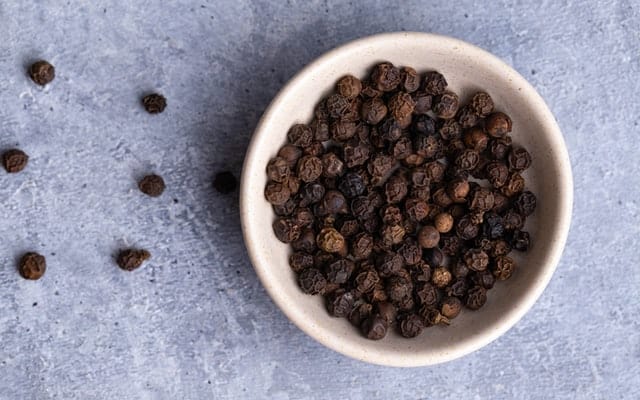
Like soulmates, black pepper and are just meant to be as dish pairings. Whether it be in restaurants, home kitchens, or any grocery store, black pepper has earned its rightful spot as a world-famous and timeless spice. When it comes to the meals we eat, we would always like to spice it up a notch, may it be pasta or a simple sunny-side-up, which would always taste better with black pepper.
As you are already aware, people with diabetes need to be cautious about what they eat and drink. So, you may be wondering: “Is black pepper safe to consume for people with diabetes?” We’re glad you asked! This article has all the essentials you need to know about black pepper, its effect on blood glucose levels, other health benefits, and precautions to consider when consuming them. Without further ado, let’s sizzle right to it.
Contents
What really makes Black Pepper the all-time infamous spice?
Black pepper has made its way across the world for a good reason and a good reason only. Black pepper is produced by grinding peppercorns, which are essentially dried berries from the Piper nigrum vine. Though both black pepper and white pepper originate from the same plant species, they are distinct in how they are prepared. Black pepper is made by cooking the unripe and dried berries, while white pepper is produced by drying and cooking the ripe seeds.
It has become widely recognized for its sharp but mild-level spicy taste that simply complements countless dishes regardless of where you are. As a matter of fact, black pepper has been nicknamed the “king of spices” in the kitchen. It has also been used in ancient Ayurvedic medicine as it contains high concentrations of potent and health-benefiting plant compounds.
Black pepper is typically grown in Asian countries, including Vietnam, Indonesia, Thailand, and China, just to name a few.
Black pepper and blood glucose levels
In short, black pepper is indeed safe for people with diabetes to consume. Interestingly, black pepper can aid in improving blood glucose control and decrease blood glucose spikes. A study on 86 overweight people taking black pepper supplements indicated significant improvements in their insulin sensitivity throughout the 8-week study.
In addition, another study conducted by Pharmacognosy Research discovered that piperine (found in black pepper) with the combination of an anti-diabetic drug was able to lower blood glucose levels significantly more than that of the anti-diabetic drug alone. In other words, piperine enhances the drug’s effectiveness.
So, how does it do this? Piperine essentially acts as an anti-diabetic agent as it is an antioxidant found in black pepper that is essentially a bio enhancer. This means that with the antioxidant, your body is able to better absorb drugs effectively. Furthermore, piperine helps maintain healthy digestion to enable improved glucose-insulin balance.
Although black pepper is deemed as a safe consumable, you must only have them in moderate amounts. This is because high amounts of black pepper has the potential to cause a blood glucose spike as it enables a higher absorption rate of nutrients. So, the next time you’re in a restaurant, always make sure you ask them to not include black pepper so you can moderately add them on your own (for your health’s sake).
Health benefits of black pepper

Aside from helping you control your blood glucose levels to a stable level, black pepper also packs in other health benefits that you may find intriguing. Here are some of the top health benefits you can get from having a sprinkle of black pepper.
Enriched with antioxidants
Black pepper is filled in abundance with piperine, which are powerful antioxidants that help protect your body against cell damage caused by free radicals. Free radicals form when the body is exposed to the environment, such as cigarette smoke, sun rays, and pollution. Any excess free radical damage may lead to health issues such as inflammation, heart disease, some cancers, and premature aging, which none of us want.
Incorporating a moderate amount of black pepper into your daily meal plans should help your body fight against free radical damage while still maintaining healthy blood sugar levels. Remember, though more black pepper means more antioxidants, you still need to account for your blood glucose levels by controlling your black pepper intake.
Aids in healthy digestion of food
If you are ever worried about having a stomachache from eating spices, be rest assured because black peppers are not the case. Contrarily, eating black pepper promotes healthy digestion. As soon as those black peppers reach your taste buds, this sends a signal to the stomach to release hydrochloric acid, an essential component to proper digestion. Depriving of hydrochloric acid may be problematic. It may cause indigestion and heartburn, hence lesser absorption of essential nutrients the body needs.
In addition, if you’ve had one too many gassy foods such as lactose-containing milk, having black pepper may help you relieve that bloaty feeling, otherwise known as intestinal gas. This might come in handy during those family gatherings.
Boosts your brain function
Piperine (found in black pepper) is the critical component to improving the functions of your brain. Based on a Food and Chemical Journal report, piperine has the potential to fight against degeneration of brain neurons, hence protecting the body from diseases that cause cognitive impairment such as Alzheimer’s.
Though it is still a developing study, researchers believe that piperine is may be able to boost serotonin and dopamine levels in the human brain. These two hormones are essential in memory formation, which means increased levels of these two hormones are capable of boosting your memory.
It may help fight off cancer-causing cells
Piperine is also capable of blocking off harmful cell growth, including tumor cells that cause cancer. To top that off, black pepper can enhance anticancer properties and effects of other spices you may be included in your diet, such as turmeric, as an example.
Precautions to consider before eating black pepper

Now that you know how black peppers affect your blood glucose levels as well as the other health benefits they may present to your body, it’s time you know how to safely eat black peppers. Because (believe it or not) there are present dangers and precautionary measures that you may not be aware of. Here is a list of important factors you should consider before eating black pepper.
Know your limit
The reason why you should only take moderate amounts (about one teaspoon at most per day) of black pepper into your meals is that excessive amounts can lead to digestion problems and may further irritate ulcers (which you may want to be cautious about).
Interaction with medications
Black pepper may also compromise the absorption of several medications, such as medicines containing lithium, phenytoin, propranolol, rifampin, and theophylline. Consuming black pepper when you are on any of these medications can boost the effects of these drugs. So, always avoid black pepper if you are taking any of these medicines, for goodness’ sake. A good rule of thumb is t have no more than a teaspoon of black pepper in a day.
Safely using black pepper
Whether you happen to be a Michellin chef at a restaurant or a regular cook at home, make sure that you always, and we mean always, sprinkle your black pepper at the end of cooking your delicious meal. Doing so helps prevent those harsh flavors and inhaling black pepper-filled fumes. Fumes containing black pepper may cause lung irritations and, in worst cases, cause anoxia. In this condition, your body’s tissues are deprived of oxygen, and that is never a good sign, especially for people with diabetes.
The bottom line
In short, black pepper is considered a safe and healthy spice for anyone, even if you happen to have diabetes. It is more than just the “king of spices,” as it also serves well in improving your body’s overall health. One of the highlighted health benefits of incorporating black pepper is its ability to help your body more readily absorb nutrients, including the effects of anti-diabetic drugs. Hence, the fact that it aids in maintaining proper digestion of nutrients keeps your glucose-insulin levels in perfect balance and preventing blood glucose spikes.
Piperine is the key component as it is a potent antioxidant that serves multiple health-protecting measures. These health benefits include protection against cell damage from free radicals, improve your brain functionalities by fighting against degeneration of brain neurons, and fighting off tumor cells that may lead to cancer.
Though black peppers are indeed safe, you should only consume them in moderate amounts or one teaspoon of black pepper a day, to be exact. When cooking, ensure you add black pepper towards the end of cooking your meals, as their fumes may irritate your lungs. Lastly, black peppers can interact with certain drugs. With that being said, we highly recommend you seek professional medical advice from your local doctor. This way, you can be rest assured knowing you can safely sprinkle some black pepper onto your delicious meals.





